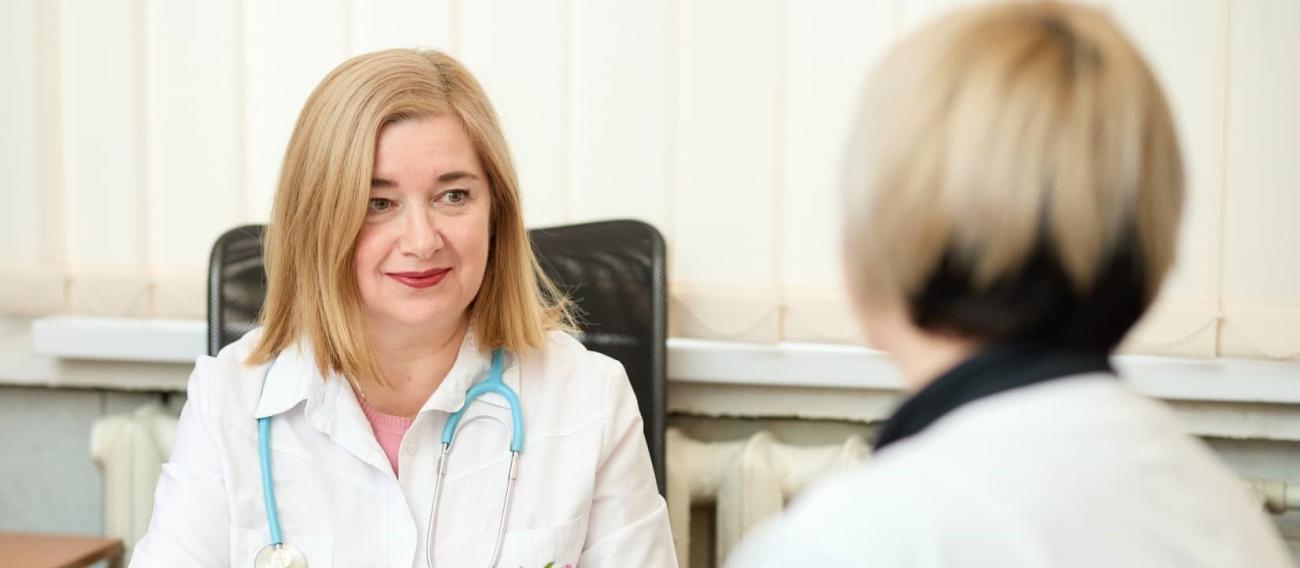Medicine is not just about equipment, procedures or medicines. First and foremost, it is about people. Doctors who guard our lives, health and hope every day.
Our doctors demonstrate united professionalism and the power of humanity. They are heroes whose stories are hidden behind white coats and long shifts. The project “Stories of Care” has been developed to make their voices heard.
We will share the stories of healthcare workers from across Ukraine. Each of them represents key medical areas, ensuring provision of accessible and high-quality healthcare services for Ukrainians
Their stories are not just about professionalism, but also about humanity, perseverance, and their impact on society.
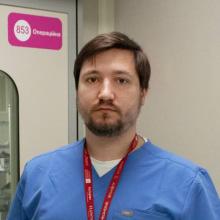
“If a child is born with a facial defect, you need to understand what to do next, how to treat the child, how to behave. And most importantly, you should always remember that in most cases, the defect can be surgically corrected, and everything will be fine.”
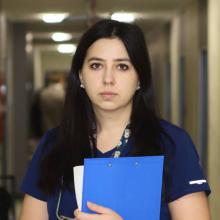
“We help people become independent and functional. Patients return home on prostheses, in a wheelchair or even on their own legs. We give them not just the ability to move — we give them a reason to live on.”
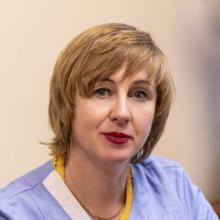
“When I see the results of our work — a disease detected in time, a life saved, or a changed habit that allows a person to become healthier — it is the highest reward. Every small step, every consultation or vaccination is a contribution to the health of our society. I am proud that we are working to make people live longer and happier.”
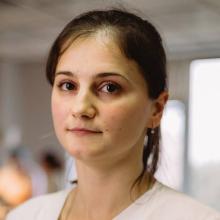
“When I see a child who was in critical condition yesterday walking, smiling and enjoying life again, I feel incredibly proud. This is the best reward — to know that your efforts have given her a chance to grow, breathe fully and be happy.”
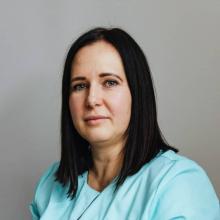
“Mental health is something that needs to be talked about. I want patients to understand that taking care of their psychological state is as important as their physical health. Every frank conversation with a doctor is a step towards regaining peace of mind and quality of life.”
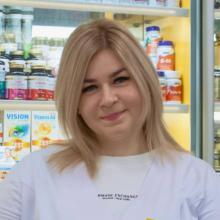
“Our work is not only about dispensing medicines. It is care, consultation, explanation. We help people take care of their health and often become those who guide patients to the right path to recovery.”
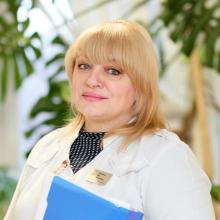
“I have always told myself that helping children is not just a job. Their smiles after recovery, their first steps are what fills life with meaning and gives them the strength to continue.”
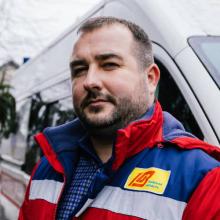
“There is nothing better than the feeling that you have done something important. When you see a person feel better after your actions, when the pain subsides, or when you have saved someone's life, it is priceless.”
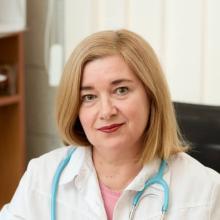
“I always emphasize to patients that prevention is the key to health. Vaccination, responsible attitude to one's body, and following the recommendations of doctors can save one from serious diseases.”
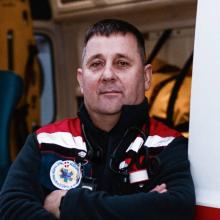
“When you help a person who was on the verge of life and death and see them return to their family, it's not just a job, it's something that fills your life with meaning.”
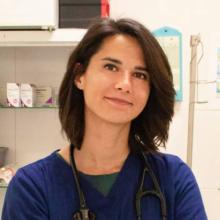
“Cardiology is not just medicine, it is a daily struggle for life. We can't always cure the disease completely, but we can give patients more time, more opportunities to live, laugh, and be with their loved ones. And this is what makes my work invaluable.”
THE LONG READ
Medicine is not just about equipment, procedures or medicines. First and foremost, it is about people. Doctors who guard our lives, health and hope every day. Our doctors demonstrate united professionalism and the power of humanity. They are heroes whose stories are hidden behind white coats and long shifts.
The project “Stories of Care” has been developed to make their voices heard. Below are a selection of stories of healthcare workers from across Ukraine. Each of them represents key medical areas, ensuring provision of accessible and high-quality healthcare services for Ukrainians. Their stories are not just about professionalism, but also about humanity, perseverance, and their impact on society.
Oleh Holubchenko
Pediatric Maxillofacial Surgeon, Kyiv
Surgery that changes lives
Dealing with children’s facial defects is the daily mission of a pediatric maxillofacial surgeon Oleh Holubchenko from Kyiv. Over the years of hard work, he has helped many young patients fix what prevents them from living a normal life and feeling as beautiful and confident as their peers. “I like surgery, aesthetics, and reconstruction. Currently, I work with pediatric maxillofacial surgery. My specialty is congenital defects of the face, head and neck. I deal with children with cleft lip, cleft palate, underdeveloped parts of the face, jaw, ear, nose, certain deformities and defects. We can fix all of this,” says Oleh Holubchenko.
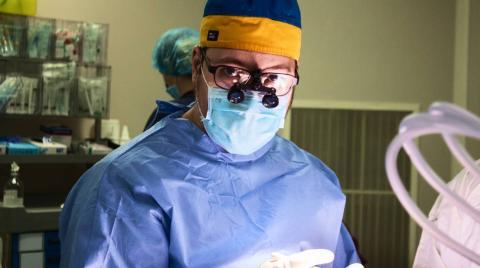
Usually, the first surgery takes place at 4–5 months, the next one is closer to 11 months, and another surgery in a year. The recovery process is gradual. “Then there is observation, correction, speech production, formation of the upper jaw, facial proportions. Deformities may occur, because everyone heals differently, it is a biological process. Then other doctors, such as a dentist, are involved in the treatment,” highlights the doctor. Children can return to the hospital over time. When they get older, they need to make additional corrections. Thus, doctors often accompany them up to the age of 18.
Treating young patients and supporting their parents
“Parents have different attitudes towards facial defects in their children. For some, it's a tragedy that a child is born differently than everyone else.” However, according to the doctor, most parents are conscious. They understand that such defects are treated, operated on, monitored, and that they can live with it. And in general, the rehabilitation is satisfactory. Facial defects, nervous children, frightened parents. These are the conditions in which oral and maxillofacial surgeons work. They have to not only surgically restore, but also monitor and support them in the future.
With a team of psychologist, speech therapist, orthodontist, otolaryngologist and surgeon, the doctors work together to help the patient and support the parents. They advise on how to prepare for the surgery and how to take care of the child after.
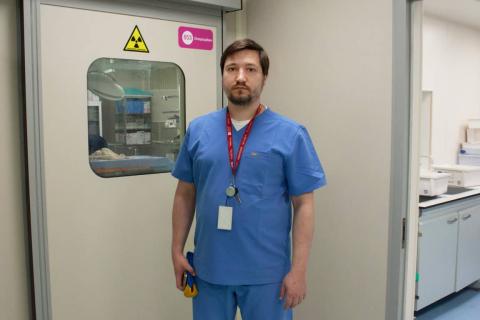
Adequate and critical attitude to work
Problems arise when parents come late. Knowing about the defect, they delay for various reasons: they are afraid, they think it will get better, or feel sorry for the child. “In such cases, I don't know how to behave properly. I feel sorry for the child, I understand that he or she has come for treatment, but parents need to be more conscious. Once a defect is detected, they should immediately start the process of analysis and then consult doctors,” says Oleh.
The work evokes a lot of emotions. Sometimes they are sad, and sometimes — joyful. But you need to be adequate and critical of each emotion, of each case. “Usually, when the operation is performed and patients come for follow-up examinations, I am satisfied with the results of my work. I am calm. I see a smiling child, parents are happy. It makes me happy. Sometimes I even think, 'I did it, didn't I? It is a very cool job,’” emphasizes the doctor.
Detecting defects at early stages and positive consequences
“When parents come to the stage of pregnancy, it shows that they are aware. And this is very good. Ultrasound doctors do screenings, and at nine weeks, it is already possible to detect a facial defect in utero. And this helps understand what kind of defect it is, what to do with it, how to prepare for it,” says Oleh.
The deformity and appearance of a child is only an external sign, but there is a need for vital correction of defects, because, if it is an infant, the child, for example, cannot eat normally. “Often parents come to the consultation already prepared. They have bought a special plaster to restrain the deformity, they bring special hooks, and advise me on how to feed the child better. This motivates me, because such parents will follow up, they will do everything in their power, both before and after the operation.” The awareness of parents determines whether they will follow the recommendations, and this determines how the wounds will heal. To ensure positive outcomes, it is important to identify defects at an early stage and always educate parents.
Kateryna Zahorodnia
Physical and Rehabilitation Medicine Specialist, Ivano-Frankivsk
Life after injuries: how modern rehabilitation changes lives
Rehabilitation medicine is more than just treatment. It is a return to life; a restoration of hope and faith in one's own strength. For Kateryna Zahorodnia, a physical and rehabilitation medicine specialist from Ivano-Frankivsk, rehabilitation has become not just a profession, but a mission. Her story is a path towards realizing the transformative power of rehabilitation and its ability to change people's lives.
“At first, I thought that rehabilitation was like outdated physiotherapy. But during my internship, I witnessed a woman who had suffered a stroke take her first steps with the support of physical therapists. Her son was crying tears of joy when he saw his mother walking again. At that moment, I realized that I wanted to be part of such stories. It was a decisive moment in my career,” shares Kateryna.
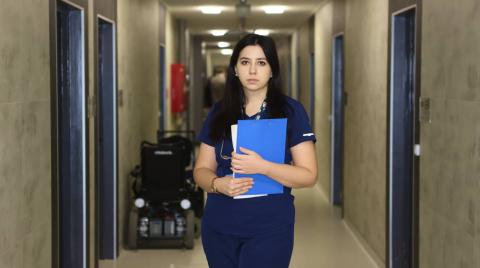
Rehabilitation and quality of life
Unlike other areas of medicine, rehabilitation is aimed at restoring a patient's functionality and ability to live a full life. “In our department, we talk about quality of life. We help people become independent and functional. Patients return home with prostheses, in a wheelchair, or even walking on their own. We don't just restore their ability to move — we give them a reason to keep going,” explains Kateryna.
Teamwork
Rehabilitation is always a team effort. Physical therapists, occupational therapists, psychologists, and social workers always work closely with patients, involving them in every step of their recovery. “Our approach is different: we don't work instead of the patient, but together with them. People are surprised by their active involvement: three hours of classes every day, focusing on every little detail. But it is this approach that gives results. Patients become motivated, can see their progress and start to trust the process. However, sometimes difficulties arise due to cognitive disorders or overprotection of relatives. We have to explain that the patient's independence is the key to their full recovery,” says the doctor.
Kateryna dreams of a time when rehabilitation services will be available to everyone. “It is important for every community to have at least a small rehabilitation center. This would enable patients to receive care close to home, rather than having to travel hundreds of kilometers. We also need specialization: separate teams to work with amputations, spinal cord injuries or orthopedic injuries. This would allow doctors to focus on their area of expertise and provide even better care to patients,” emphasizes Kateryna.
Emotions that drive you to stay in the profession
The work of a rehabilitation therapist is not easy, but it is the human stories and achievements of patients that become the main source of inspiration. “When a patient who has just received a prosthesis stands on their two legs for the first time, it is an unforgettable moment. Or when we discharge a person who can now move independently and continue living their life. In those moments, we all feel that our work truly matters. It’s this sense of purpose that keeps us motivated and committed to our profession,” says the doctor.
Nataliia Ivanchenko-Timko
Director General of the Lviv Region Center for Disease Control and Prevention, Ministry of Health of Ukraine, Lviv
Prevention for the sake of life: how doctors change the future of society
Every day, experts from the Centers for Disease Control and Prevention are on guard for public health, although their work often goes unnoticed. They examine water, air, and food, monitor the spread of infections, provide vaccinations, and work to prevent diseases so that everyone feels safe. Nataliia Ivanchenko-Timko, Director General of the Lviv Regional Center for Disease Control and Prevention of the Ministry of Health of Ukraine, shares the story of her daily challenges, successes and the crucial role of prevention. “Ukraine has adopted a Law on the public health system over a year ago. The main goal is to make sure that people live longer, get sick less and face less frequent exacerbations of chronic diseases. And this can only be achieved when communities, doctors, authorities and people themselves work together,” says Nataliia Ivanchenko-Timko.
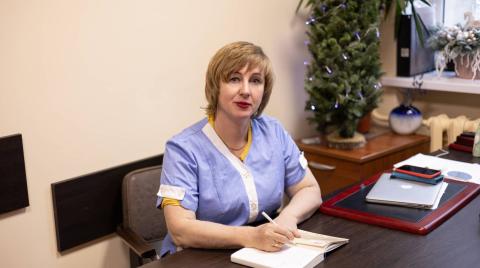
Public health is not just about fighting infectious diseases. It is a comprehensive approach that covers various areas of human life. “Public health includes the prevention of non-communicable diseases such as hypertension or iodine deficiency, work to reduce road injuries and prevent violence. It also includes environmental protection: clean air, quality drinking water, and safe recreation areas. And all of this is part of our daily work,” explains Nataliia Ivanchenko-Timko.
At the regional level, public health work is organized through the Centers for Disease Control and Prevention, which have an extensive network of district offices. These centers are responsible for monitoring and preventing the spread of diseases. “We work in two major areas: laboratory surveillance and work with people. Our laboratories regularly monitor the quality of air, water, soil, and food for bacteria, viruses, toxins, and chemicals. If a problem arises, we immediately give recommendations to the local authorities on how to fix it.”
In addition to the environment, considerable attention is paid to human health. “We are also investigating viruses that cause respiratory diseases and influenza, diagnosing measles, mumps and many other infections,” says Nataliia Ivanchenko-Timko.
The importance of prevention
Nataliia emphasizes the importance of immunoprophylaxis as a key tool for disease prevention. “We have a large cold storage room for vaccines and a special refrigerator to deliver them to hospitals. Together with medical institutions, we plan the need for immunobiological products for the next year, and we also organize mobile teams to visit communities where there are no permanent medical stations,” she explains.
Prevention of non-communicable diseases is also an important area. “Lviv Region is an iodine deficiency area, so we are actively working to solve this problem. We study the iodine content in water, popularize iodized foods, and examine pregnant women for iodine levels in their bodies. We are also implementing early screening programs, such as sugar levels, blood pressure, or cancer markers. This helps detect the disease in time and prevent complications.”
The center also works to reduce antimicrobial resistance and healthcare-associated infections. “We teach medical staff how to use antibiotics properly, how to hygienically clean their hands, and how to perform sanitary procedures so that infections do not spread in hospitals. This helps protect both patients and doctors,” adds Nataliia. “When I see the results of our work — a disease detected early, a life saved, or a changed habit that leads to better health — it is the greatest reward. Every small step, every consultation or vaccination is a contribution to the well-being of our society. I am proud that we are working to help people live longer and happier lives.”
Promoting a healthy lifestyle
Activities to promote healthy lifestyle cover both adults and children, as healthy habits should be formed from an early age. “We hold various events, such as Health 35+, where we examine employees of companies, educate them about proper nutrition, physical activity, and disease prevention,” says Nataliia Timko. “At these events, we measure blood sugar, blood pressure, body mass index, and provide recommendations for a healthy lifestyle. Dietitians teach people how to create a balanced diet to prevent obesity, cardiovascular disease or diabetes. We also engage physical activity specialists who design personalized exercise routines, such as Nordic walking, and teach people how to stay fit.”
Particular attention is paid to schoolchildren, as habits established in childhood often remain for life. “We work with school children on school nutrition reform and the creation of a safe learning environment. We explain to children what 'extra products' are and why it is important to avoid excessive consumption of sweets, fast food or carbonated drinks. All this happens in an interactive way: we play with children, show them what a ‘healthy plate’ looks like, and teach them how to make healthier food choices.”
The work of mobile medical teams
“I remember a case in the Brody community. A woman with a goat approached our medical bus. The goat was held, and she was examined, vaccinated and prescribed treatment. She admitted that she couldn't go to the hospital because there was no one to take care of the goat. This is the main idea — to make sure that medicine comes to people,” says Nataliia Ivanchenko-Timko.
“And there are many such stories. We travel to remote villages where there are no permanent medical facilities to reach as many people as possible who are unable to get to the hospital on their own. Some people are afraid to leave their farms, some are afraid to travel far, and some simply do not know how to go to a doctor. We understand these challenges and try to provide services on the spot.”
Mobile teams are not just about medical care, but also an important step towards raising public awareness. “In such communities, we do comprehensive work. During one visit, you can have your blood pressure measured, get vaccinated, check your blood sugar, consult a doctor, and even get help from a psychologist. This is especially important now, during the war, when many people are stressed or do not go to doctors because of fear or lack of time. We can demonstrate that it is easy to take care of your health and that help is available,” explains Nataliia.
These visits also have an important social effect: they build trust in doctors and teach people to be more mindful of their health. “After such health days, people start changing their behavior. Someone thinks about prevention for the first time, and someone receives timely treatment that can save lives. For us, it is a special motivation to see how concrete help brings results and changes the lives of people in the most remote corners of the region.”
“Every visit to the community, every patient examined, reminds us why this work is so important. We come to the places where medicine seems unreachable, and we can see how people get the help they need, which they would not otherwise receive. For me, it's not just a job — it's a mission, thanks to which we change people's lives for the better,” explains Nataliia.
Despite the wartime challenges, the public health system in the Lviv region is actively developing, and people are beginning to value prevention more. “We are working to ensure that everyone can live longer, stay healthier, and receive timely care when needed. Prevention is always easier than treatment, and when it becomes a habit for everyone, we will be able to achieve significant changes,” says Nataliia Ivanchenko-Timko.
Hanna Vlasenko
Anesthesiologist, Kyiv
Work, trust, empathy: what it means to be an anesthesiologist
An anesthesiologist should be with the patient in the most difficult moments — from the moment he or she prepares for the procedure to the time when he or she wakes up after surgery. This is the main rule of Hanna Vlasenko, an anesthesiologist from Kyiv, who helps children every day, relieves their pain and returns them to the joy of life. Her story is about a profession that has become a true calling.
“I was always looking for a specialty that would interest me and give me a sense of inner fulfillment. When I got the opportunity to work in anesthesiology, I decided to try it. And then I realized that this is where I can help people go through the most difficult moments of their lives without pain. This is extremely important for children. We can make sure that they do not suffer during manipulations and surgeries, that their experience is protected — both physically and emotionally,” says Hanna Vlasenko.
For many patients, pain relief is perceived as something familiar, but it is the doctor's responsibility for the patient's comfort and safety. Especially when it comes to children. “Some procedures are incredibly traumatic, and if a child undergoes them without sedation or anesthesia, it can even be dangerous. In such cases, the body can react to pain with sudden pressure surges and changes in heart rate. Sometimes this even leads to serious heart rhythm disorders. My task is to protect the child from these risks.”
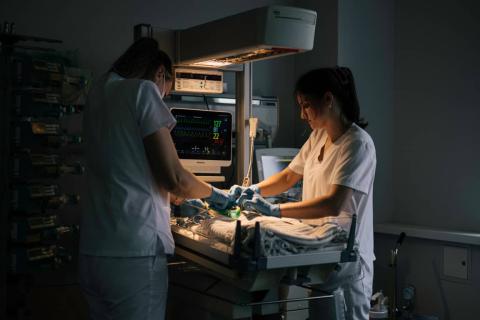
The result of work is the greatest motivation
The doctor's work is full of challenges, but it is the result that gives strength and inspiration to work further. “I am most inspired when I can see the results. For example, a child was in critical condition, decompensated, and needed intensive care. A few days later, she was walking, smiling, and playing. Her saturation rose from 70 to 95, and you realize that now she will have a chance for a normal life. She is no longer at risk of hypoxia, which could cause developmental delays or other complications,” adds Hanna.
The medical profession is not only about knowledge and practice, but also about moments that touch the soul and remain in your memory for a long time. “Once we had a very difficult patient. When he was being discharged, the boy's sister tied little hearts from thread and gave them to us as a gift. It was the moment when you just stood there with goosebumps and tears in your eyes, realizing that your work is not in vain.”
Approach to children and parents
Every child is a separate world, and you need to find your own key of trust for each one. Especially if fear and pain become an obstacle to treatment. And without parents’ understanding and support, successful treatment of a child becomes much more difficult.
“The hardest part is explaining to parents. They want the best for their child, but sometimes they hide important things, such as fever or other symptoms, so that the surgery can't be postponed. They do not always realize that this can worsen the child's condition. Working with parents is very important: their support and preparation of the child affects the outcome. If the mother cries, the child also becomes anxious, which complicates the process,” explains the doctor.
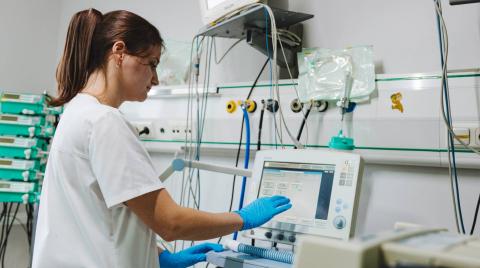
About accessibility of medicine
Today, medicine has become much more open and accessible, but many people are still afraid to seek help.
“Parents are afraid that they will be asked for money because they do not understand how affordable it is. Now we are trying to open up more information. Doctors run social networks and show that they can consult for free. People see that no one is hiding anything, that everything can be discussed openly. This gives people hope,” says Hanna. “My profession constantly teaches me new things. Each child requires an individual approach, and each case becomes the basis for future work. This is what makes my job both challenging and incredibly important.”
Kateryna Poshtaruk
Family Doctor, Kyiv
Mental health as a challenge and an opportunity: the story of a doctor who changes the approach to patients
Mental health is an important part of overall well-being that cannot be ignored. Kateryna Poshtaruk, a family doctor from Kyiv, uses a holistic approach to help patients maintain or restore their health. For many people, she is the first to raise the challenging topic of mental health and help them find answers to difficult questions. Her mission is not only to treat physical ailments, but also to take care of the mental state of patients by supporting them.
“We are increasingly realizing that many physical complaints of patients have a psychological basis. Previously, this was often ignored, but now we pay more attention to these issues. If a family doctor understands the importance of mental health and knows how to talk about it, patients also become more open to such conversations. This allows us to quickly identify problems and provide help,” explains the doctor.
Family doctor as a first contact specialist
Family doctors are often the first to notice signs of stress, emotional exhaustion, or anxiety disorders in patients. The role of primary health care in the timely detection of such manifestations and the provision of support is key. “It is important for us that patients understand that mental health can and should be discussed. If I, as a doctor, demonstrate that it is normal and important, the patient trusts me more and is ready to seek help from a psychologist or psychiatrist. This is a big step forward in the fight against stigmatization,” says Kateryna.

Education and development: the basis of quality care
Kateryna works hard on her own professional development and trains her colleagues. She believes that quality care begins with the education of doctors and medical staff. “There are many training opportunities available now. For example, WHO's Mental Health Gap Action Programme (mhGAP) provides practical tools for working with patients. We learn how to talk about difficult topics, how to build a dialogue, and how to help. This knowledge is invaluable, as it allows doctors to become more confident in their work and better understand the needs of patients,” says Kateryna.
Mainstreaming mental health
The war has exacerbated mental health issues for both patients and medical professionals. Kateryna and her colleagues conduct training sessions to educate people on how to cope with emotional stress and support others. “After the war began, we realized that we could no longer ignore mental health issues. We organized trainings, invited speakers, and started gaining new skills. When you understand how to help yourself, you can pass that knowledge on to your patients. This is something everyone needs now,” says the doctor.
One of the biggest problems, according to Kateryna, is coordination between different levels of medical care. The lack of clear interaction between primary care and specialized services complicates the treatment process. “We can recognize a problem and refer a patient to a mental health professional, but we are not always sure that they will receive quality care. It requires systematic work to ensure that every patient has a clear route and access to the necessary services,” emphasizes Kateryna.
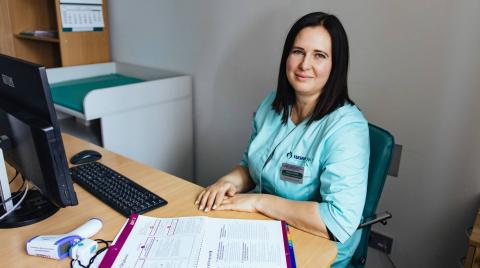
Caring for doctors: the basis of quality care
Kateryna is convinced that caring for the mental health of medical professionals is just as important as working with patients. “Doctors and nurses also need support. We deal with difficult stories and work in stressful conditions. To maintain the resilience of healthcare workers, it is important to provide them with psychological support so that they can continue to help others.”
Anastasiia Bavenko
Pharmacist, Kyiv
Pharmacists on guard of health: care that changes lives
Being a pharmacist is more than just dispensing medicines. It is a profession that requires knowledge, empathy and a desire to help. For Anastasiia Bavenko, a pharmacist from Kyiv, the choice of this profession became obvious in her childhood. Her mother worked in a hospital, and young Anastasiia often accompanied her there. “When I was a child, I was given a small medical gown, and even then, I knew that I would be connected to medicine. I was fascinated by how medicines interact with one another and how they affect health. I wanted to help people, and that’s what I do every day,” says Anastasiia.
“A pharmacist is not just a person who dispenses medicines. We are those who listen, explain, and help avoid mistakes. Often people come to us under stress, forgetting what the doctor said, or confused about the dosage. And when you see how a person calms down after your consultation, begins to understand what to do and how to do it, it gives you real pleasure. At such moments, you feel that your work is about support and care.”
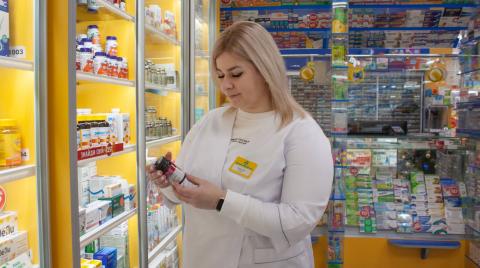
Affordable medicines and patient responsibility
One of the key aspects of our work is the Affordable Medicines Program. It enables many patients to continue treatment of chronic diseases even in difficult economic conditions. “Every day, we dispense medicines based on electronic prescriptions. People have become more responsible about their treatment, as they now know that they can get the medications for free or at a reduced price. For example, patients with diabetes or hypertension no longer drop out of treatment due to financial difficulties. It really changes the quality of life,” says Anastasiia.
Stereotypes about pharmacists
However, society often underestimates the importance of the pharmacist profession, calling them “salespeople”. “Some people think that we are just dispensing medicines, but our work is much deeper. We may not be doctors, but we often help patients navigate their choice of medicines. For example, if a person has ordered several similar medications online, we can warn them about the risk of overdose. Often patients forget how to take their prescribed medications, and we explain the correct dosage or method of administration. This is a big responsibility,” highlights Anastasiia.
Pharmacists as first responders
Pharmacists play an important role in preventing and maintaining public health. “When people come to us with a cough or other symptoms, we advise them to see a doctor. But sometimes we need to help a person quickly, for example, to explain how to dilute medicines or take them in difficult cases. We are there to support, explain, and guide them, and many people follow our advice,” says Anastasiia.
Humanity in every interaction
Anastasiia emphasizes that even in the most challenging moments of work, it is crucial to remain human. “During the war, people have become more anxious, which is understandable. Our task is to stay calm and help. We have to support patients and do our best to ensure that they receive quality care.”
Lina Cherhinets
Pediatrician, Dnipro
Medicine for children: new challenges, team cohesion and modern treatment standards
Pediatricians care for the youngest patients, giving them a chance for a healthy life even in the most difficult circumstances. For Lina Cherhinets, a pediatrician from Dnipro, this profession has become a mission to improve the lives of children and their families. Her work extends beyond her routine duties — it is a daily responsibility for the health, care and happiness of young patients. Her story is a journey from a young pediatrician to a leader, heading a close-knit team, all working tirelessly to save the lives of every child.
“After my internship, I started working as a pediatrician. For me, pediatrics has always been the most compassionate field in medicine. I couldn't see myself anywhere else but working with children. Their smiles, their first steps after recovery — these are the things that give me the strength to keep working. I always told myself: every child must live, every child must recover. And we will do everything possible and even impossible to make this happen,” says Lina.
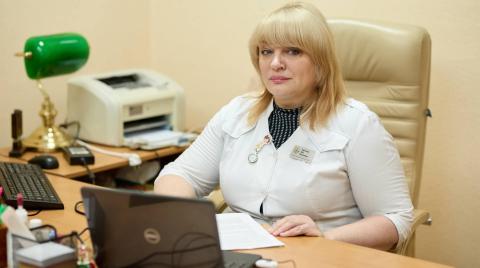
Modern medicine: challenges and achievements
“Today, healthcare in Ukraine is much more accessible than it was 10–15 years ago. Now we have equipment, medicines, and protocols that adhere to the international standards. We have introduced digital X-ray machines, modern ultrasound scanners, and if necessary, our patients can undergo MRI or CT scans free of charge. This is a significant step forward that allows us to make diagnoses quickly and accurately,” explains the doctor.
The team is like a family
For Lina Cherhinets, the team is the heart of the hospital and the foundation of its success. “We have always been united, but this was especially evident during the war. We have created a true team of like-minded people, where everyone knows their role and does their best for the child. We pass on our traditions and values that we have built over the years to young doctors and nurses. This is our second family,” says Lina.
A special place in her heart is held by the memory of her colleague and mentor, Viktor Hryhorovych Slatvitskyi, who led the hospital during the COVID-19 pandemic but tragically passed away from this infectious disease. “He lived for this hospital, he was the first true teacher for many of us. His values became the foundation of how we work today. We are doing our best to honor his memory and continue his work with dignity.”
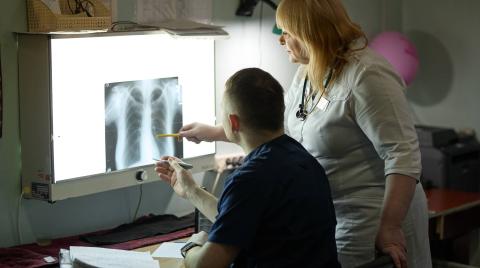
New challenges
The war brought unprecedented difficulties to the hospital, but it also revealed the resilience and dedication of its team. “In the first months of the war, we received many internally displaced persons. People came to us with their children, having nothing. We helped them not only medically, but also emotionally: we supported them, shared clothes and food. Our work has become even more meaningful. Children without parents now often stay with us, as social support centers have relocated abroad or to the western regions. This is a big problem, but we do our best to provide them with care,” says Lina.
Our mission is children's health
Every day at the hospital is a fight for the health of children who need to recover and live a full life. “We work by the principle: ‘How would I want my own child to be helped?’ This is the motto of our team. We do not just treat; we help, support and believe that every child deserves a chance. And for this, we are ready to work day and night,” summarizes Lina Cherhinets.
Vitalii Ihnatchuk
Senior Paramedic, Ivankiv village
Saving lives: how emergency medical care works
Emergency medical care means speed, accuracy and dedication. When every second counts, those who are ready to act in any situation are the first to arrive on the scene. For Vitalii Ihnatchuk, a senior paramedic from Ivankiv village, his job is not only a profession, but a lifelong calling.
“When I started working in the ambulance, besides the desire to help, I was also excited by the adrenaline and the speed of decision-making,” says Vitalii. “Before, an ambulance was almost like a taxi, but now everything has changed. Each car has defibrillators, electrocardiographs and other necessary equipment. We work in conjunction with a dispatcher who immediately coordinates us to the right hospital. This saves time, and time is known to save lives.”
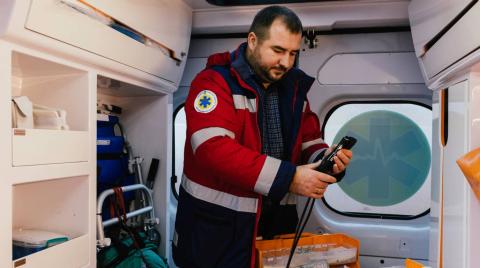
Help and inspiration
The most important aspect of Vitalii's work is seeing the result of the help he provides. “There is nothing more rewarding than the feeling that you have done something important. When you see someone feel better after your interventions, when the pain subsides, or when you have saved a life, it is priceless. That's what inspires me to keep working, even in the most difficult conditions,” says the senior paramedic.
The work of an ambulance has always been demanding, but the war has brought even greater challenges. “We work based on the same principles, but we have added a disaster medicine team, which has significantly increased our efficiency. Now, we only respond to emergencies: bleeding, road accidents, strokes. All calls are coordinated by a dispatch center, which greatly simplifies the process. People are taking more care of themselves, but we are always ready to help.”
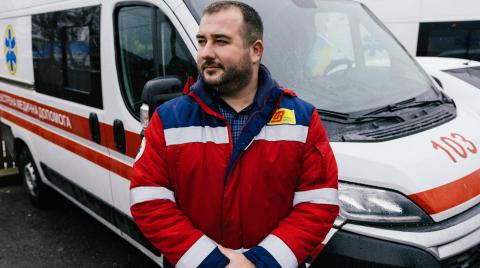
Gratitude from people is the greatest reward
For Vitalii, the most valuable thing is the gratitude he feels from his patients. “You realize that even in the most difficult conditions, your work was not in vain. It's not just gratitude, it's a sign that you really changed someone's life for the better, sometimes saved them,” concludes the paramedic.
Kateryna Lytvyn
Infectious Disease Specialist, Dnipro
Preventing and combating infectious threats: how infectious disease specialists save lives every day
Infectious diseases are a challenge for modern medicine, requiring doctors to be constantly prepared and professional. The work of infectious disease specialists goes beyond treatment — they must also prevent outbreaks, control the spread of dangerous diseases, and combat antimicrobial resistance. Kateryna Lytvyn, an infectious disease specialist from Dnipro, has been dreaming of dedicating herself to medicine since high school, and has been protecting the lives and health of her patients for 30 years. “Infectious diseases are my passion. I have always admired this specialty. It offers the opportunity to witness the results: the acute course of the disease ends with recovery, and prevention helps prevent outbreaks of dangerous diseases. This inspires and motivates me to continue working in this field,” says Kateryna.
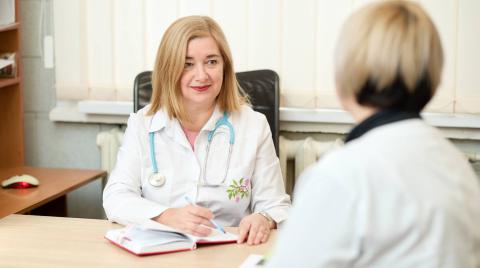
Modern challenges of infectious diseases
The area of infectious diseases is always at the center of global challenges: pandemics, disease outbreaks, and antimicrobial resistance. “Today, medicine faces the threat of the so-called post-antibiotic era, when even the simplest infections can become deadly due to antimicrobial resistance. This is a challenge not only for infectious disease specialists, but for all healthcare professionals. We need to implement the latest technologies, improve interdisciplinary cooperation and be prepared for emergencies, such as potential disease X,” explains the doctor.
Patient responsibility is the key to success
Kateryna emphasizes that the outcome of treatment depends not only on the doctor but also on the patient. “Often we face the wrong approach to health: people think that doctors have to do everything themselves. But without a responsible attitude of the patient, it is impossible to achieve a positive result. This is especially true when it comes to prevention — such as vaccinations, following recommendations, and seeking help in a timely manner. Parents who refuse to vaccinate their children are putting their lives at risk. We see diseases that could have been prevented, and it's difficult to accept,” emphasizes the infectious disease doctor. “Preventive medicine can prevent serious diseases. Vaccination, proper nutrition, and regular medical examinations are the foundation of good health. As doctors, we strive to communicate this to every patient, but society must be ready to cooperate.”
The war has brought new challenges, but the team of infectious disease specialists continues to work at the forefront of the fight against diseases. “Our work requires constant readiness. The war creates conditions that contribute to the spread of infections due to stress, malnutrition, and poor hygiene. We anticipate an increase in flu, COVID-19 and even new strains of infections. And our goal is to be prepared and respond quickly,” says Kateryna.
Trust in the doctor is the basis for change
An important step in the development of medicine is to build trust between the patient and the doctor. “Medicine is constantly evolving: digitalization, hospital autonomy, and the availability of medicines are changes that make patients' lives easier. But trust in a doctor remains the foundation. As doctors, we must work in such a way that patients feel confident and know that they will receive the best care.”
Anatolii Kaleniuk
Emergency Medicine Doctor, Lutsk
Emergency medical care: a calling to save lives
The life of emergency medical professionals is filled with challenges, decision-making at critical moments, and priceless moments when the team's efforts help save lives. For Anatolii Kaleniuk, an emergency medicine doctor from Lutsk, this journey started with a personal story that shaped his life.
The key moment that changed everything
At the age of nine, Anatolii underwent two complex surgeries that saved his life. “It was a miracle that I survived, and it was a sign for me. I decided then that I would become a doctor to help people the way I had been helped,” recalls Anatolii.
After graduating from medical school, Anatolii Kaleniuk worked as a family doctor, but quickly realized that his calling was in emergency care. Since 2001, he has devoted himself to working in an ambulance, and later became the head of a district department.
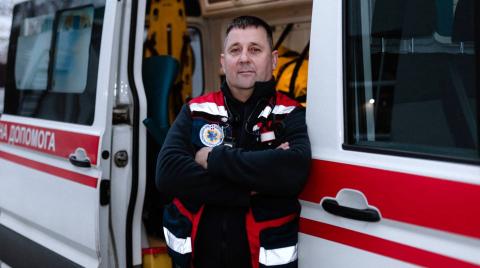
A job that inspires
Over the years, Anatolii has gained not only considerable experience but also recognition among his colleagues. He participated in competitions among emergency teams, where his team won prizes. But the greatest satisfaction comes from training paramedics: “My dream is to prove that trained specialists can work as effectively as doctors. And when I see them successfully resuscitating patients or performing complex procedures, it inspires me.” Working on calls brings special motivation.
“In every challenge, even the most difficult, there is a moment when you see the impact of your actions. It can be tears of gratitude in the eyes of a patient, a smile after suffering pain, or just words of appreciation. These moments remind us why we are here, why we do this difficult job every day. When you help a person who was on the brink of life and death and see them return to their family, it's not just a job — it's something that fills your life with meaning.”
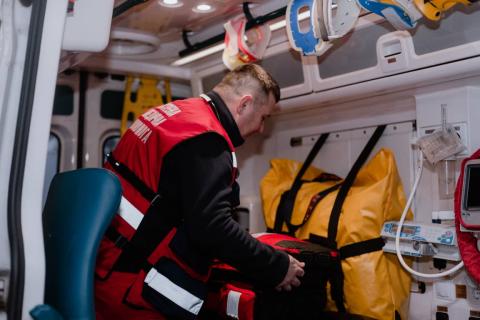
From challenges to victories
Emergency care in Ukraine has changed significantly in recent years. “Today, we have everything we need — from modern cars to medical equipment. Whether the patient is in the countryside or in the city, everyone receives quality care,” says Anatolii. Despite these improvements, there are still challenges.
“There are patients who perceive an ambulance as a taxi. But we have to convey the message that emergency care should work where it is really needed. Every call is a new test of our strength, knowledge, and humanity. There are moments when there is no time to think, and decisions have to be made instantly. But when you see your team succeed, the patient has been given a chance to live, and the team has worked together, you feel a real sense of victory.”
Looking ahead
Anatolii believes in the power of change and is actively supporting the reform that introduces a system of paramedics. “This is an important step that will help improve the quality of emergency care. Training and testing encourage improvement. Emergency care is not just about speed, it is about quality and results.”
Oleksandra Dudnyk
Cardiologist, Kyiv
How cardiology gives new chances for life
Cardiovascular diseases are among the leading causes of death globally. Working in cardiology is not just about fighting the disease, but also about constantly searching for new solutions to improve the quality of life. This is a dynamically developing field that requires up-to-date knowledge, empathy, and determination from doctors. For Oleksandra Dudnyk, a cardiologist from Kyiv, her work has become not only a profession but also an opportunity to influence the most valuable aspects — the health and future of her patients.
“Cardiology is fascinating in its scope and importance. What I really appreciate is the ability to accompany a patient throughout the entire treatment path: from initial diagnosis to complex surgical interventions and even heart transplantation. We have everything we need for effective treatment,” explains Oleksandra.
Scientific progress is opening up more and more treatment tools for cardiologists. At the same time, the doctor emphasizes that prevention remains a key aspect in the fight against heart disease. “Cardiology is not just medicine, it is a daily fight for life. While we may not always be able to cure the disease entirely, we can offer patients more time, more opportunities to live, laugh, and be with their loved ones. And this is what makes my work invaluable.”
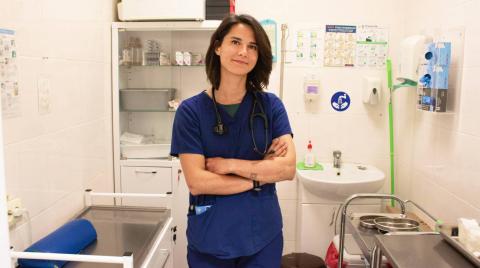
The most common stereotypes
Many patients believe that cardiovascular diseases affect only the elderly. As a result, they can ignore the first symptoms or do not seek help from specialists. “Unfortunately, many people neglect regular examinations and recommendations for lifestyle changes. People often want to jump straight to medications, skipping an important stage of prevention. However, changes in diet, physical activity and stress management are the foundation of treatment for most cardiovascular diseases,” emphasizes Oleksandra.
War as a challenge for cardiology
The work of cardiologists has undergone significant changes during the war. “We are seeing an increasing number of young people with severe complications. Stress, physical exertion, and lack of access to timely medical care lead to the development of serious health issues. This applies to those for whom stress has become a part of everyday life,” highlights Oleksandra.
Looking to the future
The development of personalized medicine and the use of genetic data to predict risks will further improve the effectiveness of treatment. However, at the same time, this poses new challenges for doctors: high research costs, the need for continuous training and integration of modern approaches into the healthcare system. “Cardiology will always remain an industry that requires innovation, attention to detail and close contact with patients. But the most important aspect is witnessing how our work gives people more years of healthy life.”
“Medicine is constantly evolving, and this is what I find most inspiring. Today, we are already talking about personalized approaches to treatment, genetic research, and the latest diagnostic and therapeutic methods. This allows us not only to prolong patients' lives, but also to improve their quality. But above all, there is hope — hope for the patient that they can live a full life, and for the doctor that every action matters. I believe that the future of medicine lies in the combination of science, technology and humanity,” says Oleksandra Dudnyk.
